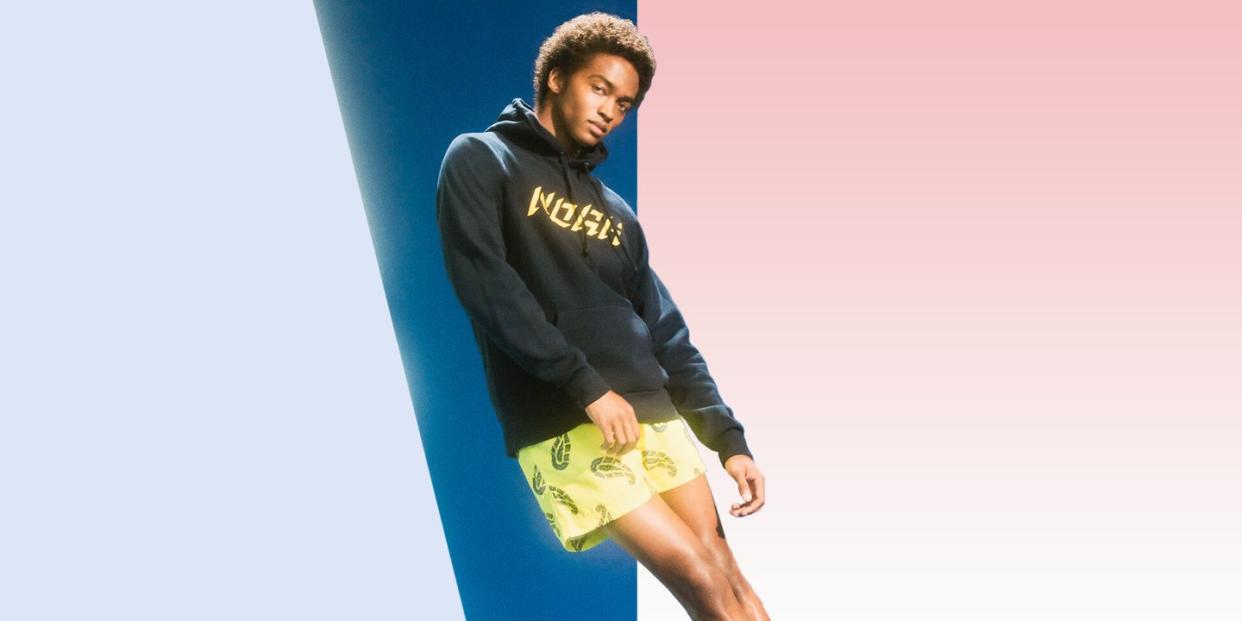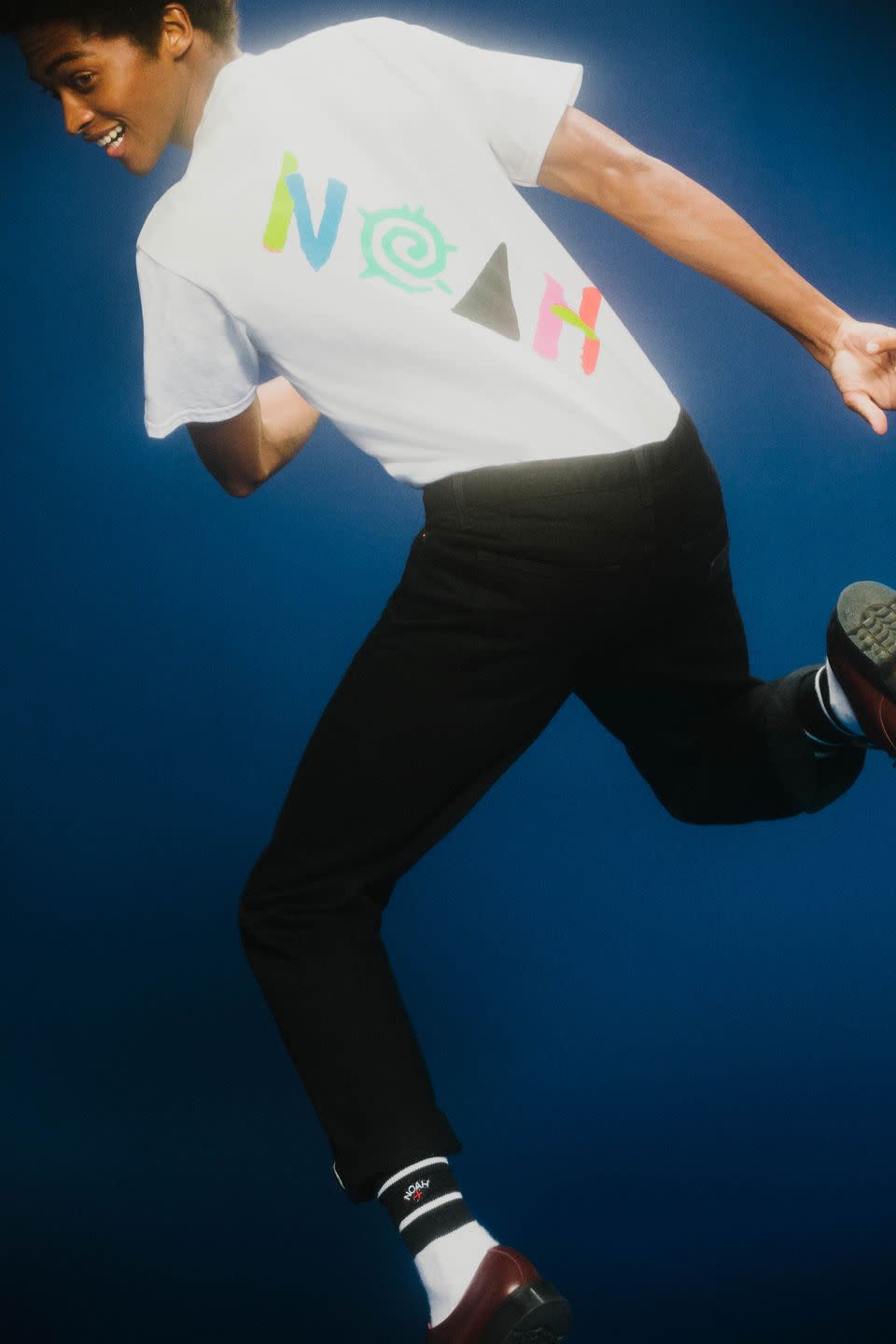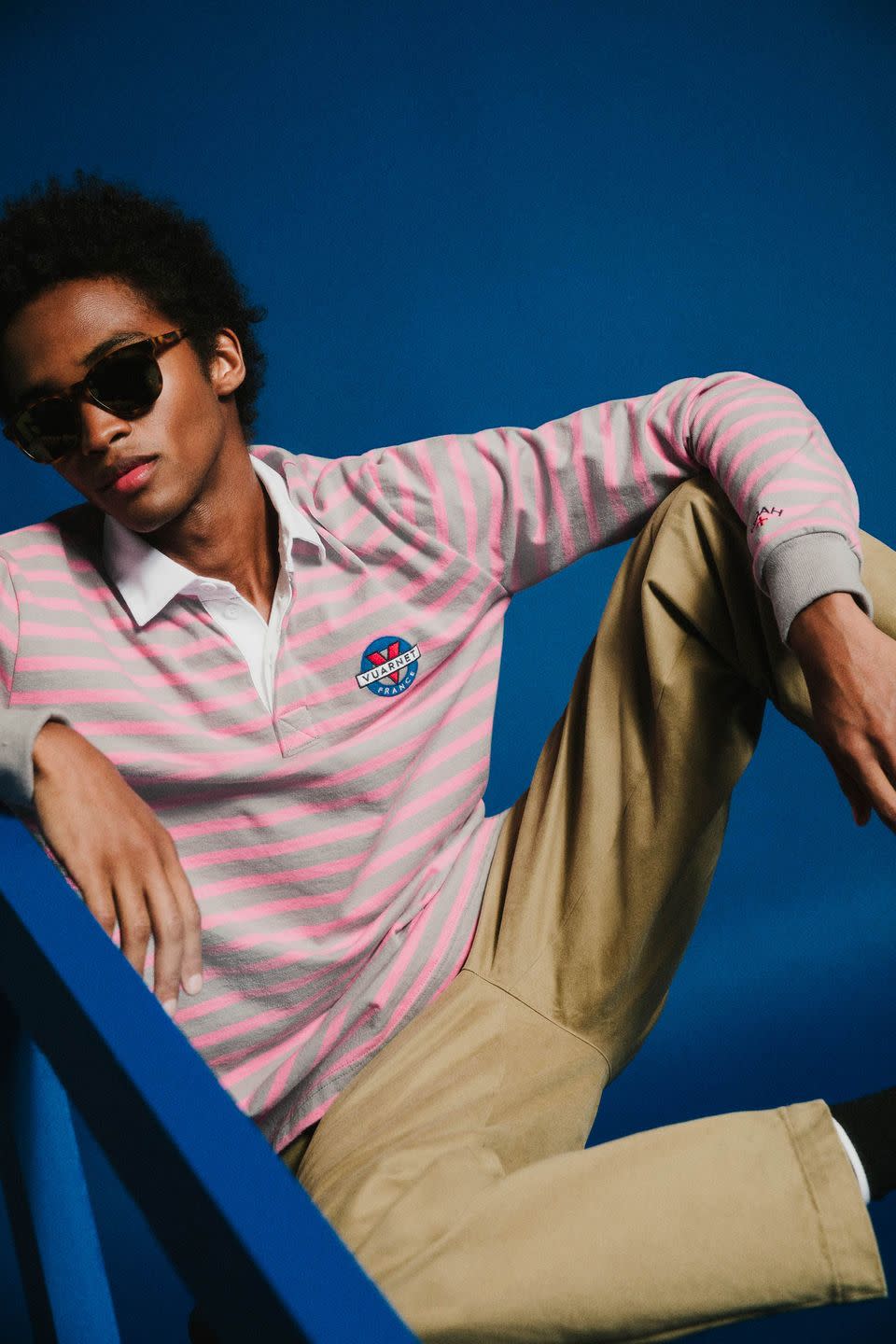Noah and Nordstrom Are Throwing a 'Post-Apocalyptic Beach Party' With Their New Collaboration

Not to bandy about menswear conspiracy theories, but it’s almost like Noah’s Brendon Babenzien has some sort of unnatural insight into the future. “We wanted it to be the kind of weird, post-apocalyptic beach party scene,” he says of the NYC-based brand’s new lineup of apparel, accessories, and footwear, which just landed at Nordstrom today. A post-apocalyptic beach party, you say? I mean, damn. What could possibly be more tuned into the vibe of summer 2020 than that? Thing is, he landed on this particular creative direction way back in the Before Times of 2019. Makes you think.
Okay, before anyone goes adding Babenzien or Nordstrom's senior vice president of Designer & New Concepts Sam Lobban to their “Illuminati Lizard People in Fashion” lists, there’s a perfectly rational explanation for the look and feel of the assortment of Noah product Nordstrom is presenting as the latest installment of its New Concepts series: 2019 seemed pretty bleak, too! Well, at least at the time, when Babenzien was trying to find a way to address the fact that we have an enormous amount of plastic waste in our oceans (hence the beach theme).

“A year ago, we thought the world was pretty screwed up,” he says, “and it's gotten a lot worse. It was pretty interesting to be a part of that process and continue with the direction we chose, which is the same as it always was.”
Since its inception Noah has been, if not an Issues Brand, a brand that cares about the issues. There’s a dedication to talking about the things that Babenzien and his wife and cofounder Estelle Bailey-Babenzien care about, whether that’s making clothing in responsibly managed factories, stamping out racism, or focusing on the environment. Of course, the clothes have to come correct, too, “so it's not just all message and no product or all product and no message,” as Babenzien says. “We try and find the balance.”
It’s that dedication to both product and message that made Nordstrom’s Sam Lobban want to bring the brand into the New Concepts fold. “I'm a big fan of Noah and what he's doing there from a product perspective,” Lobban says of Babenzien. “But also, he and Estelle and the broader team that they've knitted together, they're really using the brand to talk about all these kinds of subjects that are really important to them. Be that very big current sociopolitical concerns that they have about things that need to change or, to be honest, more nuanced cultural elements,” like music, art, dancing, or even a specific venue or bar.
Speaking of those cultural elements: Noah has them in spades, from surf and skate to prepster classics to neon-tinged and swirly-logoed ‘80s vibes (complete with collaborations with bands like the B-52s). And if you’re wondering if those seemingly disparate styles work together—really, in 2020?—you’d do well to consider the power of dropping a country club-favorite madras on a skater-approved bucket hat, or just how good a floral B-52s hoodie looks with some yellow paisley-printed chinos that aren’t quite “fuck you” pants but also kind of are.

Everything just mentioned—plus fan favorites like rugby shirts and camp shorts, and even a double-breasted white suit with Gurkha trousers—is available in the Nordstrom selection, by the way. It’s a vast swath of sartorial (and, yes, cultural) ideas. That was by design. “We as a team didn't look at what Noah would do and think, ‘Well if they do five things it's only these two pillars that would really make sense to the Nordstrom guy,’” Lobban says. “Actually I was thinking the opposite: The more that we could share with the world, the more I thought it would appeal to our customer.”
One thing that was up in the air, however, was the timing of this whole affair. The theme may have been serendipitously (or distressingly) relevant to this particular time, but the reality of selling clothing in the midst of the one-two punch of a pandemic and period of unrest during the current protests for social justice was not lost on Lobban or Babenzien. Ultimately, though, both decided that it was better not to wait. This year has been especially hard on small businesses; postponing would mean that Noah, which had already paid to produce the clothes, would bear the additional brunt of waiting to sell them. Plus, in a time when consumers are better equipped than ever to sniff out corporate bullshit, Noah wasn’t already (to continue the boxing metaphor) on its back foot.
“I wouldn't say we were prepared for this, but, I mean, our business already operated as if the world was coming to an end anyway,” Babenzien says. “We built the business to try and combat big news we didn't like, whether it be plastics in the ocean or social injustice. We've always participated with the business trying to be a vehicle to make corrections where they needed to be made. So we’re kind of positioned well, in a weird way, when bad things happen, because we were already in the conversation, we were already fighting this way.”
Which brings us back to that post-apocalyptic beach party, which feels, in context, like a defiant shout against what is already happening as well as a last hurrah before what’s to come. Babenzien, for his part, believes the negative economic and social repercussions will run deep and extend for a while. Still, he’s not necessarily pessimistic about the future writ large. For one thing, this situation has “kicked me in the head and made me think a little bit differently about things, which is better for the business,” he says. “Because if the business is strong, it will allow us to go forward and do all these other things we always wanted to do, whether it be to talk about certain issues or raise money for things, make certain items.”

Plus, he’s confident that though it’ll require perseverance, that faith in the future can extend to the greater creative community. “I anticipate things are going to get pretty damn dark, and it's going to take a real strength for young people to create positive and new ideas and creativity,” he says. But he’s “old enough to remember New York in the '70s and into the '80s,” and the absolute onslaught of art, music, and expression born of relatively desperate times. “So I hold out hope for that,” he says. “I expect things to get really interesting over the next five to ten years.”
You Might Also Like

